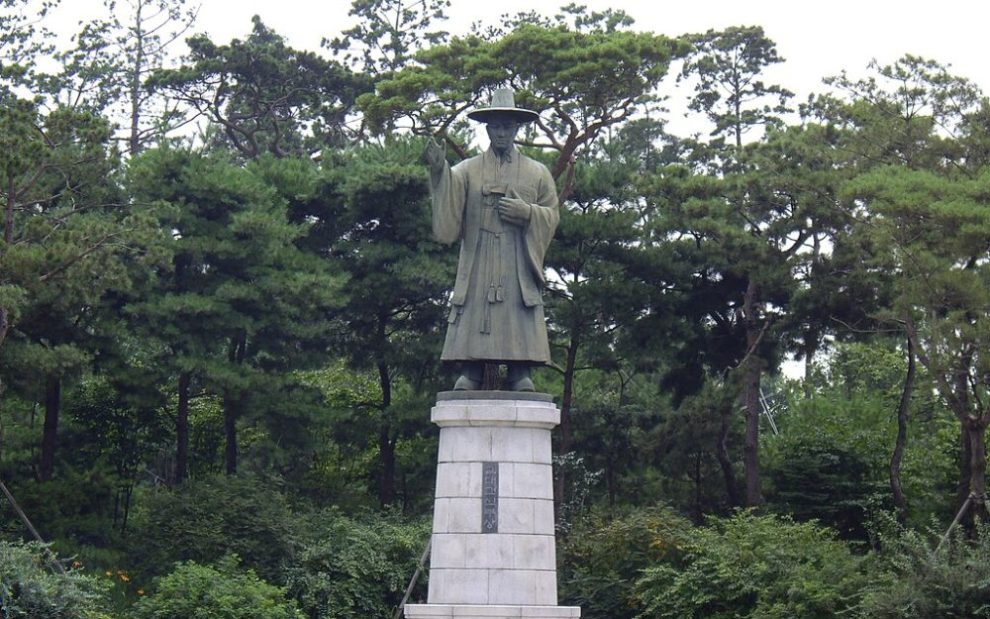The following excerpt is adapted from Our Church Speaks by Ben Lansing and D.J. Marotta. ©2024 by Benjamin Terry Lansing and Daniel John Marotta Sr. Used by permission of InterVarsity Press. www.ivpress.com.
Christianity was introduced to Korea in the late eighteenth century by Korean laypeople who encountered the faith while studying in China (Butler’s Lives of the Saints: New Concise Edition [London: Burns & Oats, 1985]). The kingdom of Korea had been isolated from the outside world for many centuries by rulers who were suspicious of foreign influences. Despite this isolation, many Koreans were compelled by the teachings of Jesus, and a grassroots movement soon became widespread in Korea long before outside churches could provide clergy or institutional infrastructure. Many Confucian Koreans were hostile to the new faith, and thousands of converts were put to death for refusing to offer incense to their ancestors.
Among these martyrs was the first ordained Korean priest, Andrew Kim Taegon. Kim’s father had been martyred when Kim was young. Kim was bolstered in his faith, despite the dangers, and determined to seek theological education and ordination. This meant leaving Korea while still a teenager to study the faith in China and the Philippines. After nine years of education, he was ordained in Shanghai and returned to Korea as the first Korean-born Christian priest.
Kim’s ministry did not last long. At age twenty-five, he was executed near Seoul. In his final exhortation before he was beheaded, he encouraged his flock, “No matter how fiercely the powers of this world oppress and oppose the church, they will never bring it down. Ever since his ascension and from the time of the apostles to the present, the Lord Jesus has made his church grow even in the midst of tribulations. For the last fifty or sixty years, ever since the coming of the Church to our own land of Korea, the faithful have suffered persecution over and over again. . . .
But, as the Scriptures say, God numbers the very hairs of our head and in his all-embracing providence he has care over us all. . . . Hold fast, then, to the will of God and with all your heart fight the good fight under the leadership of Jesus” (From the Final Exhortation of Andrew Kim Taegon, Priest and Martyr, Liturgy of the Hours © 1973, 1974, 1975, ICEL).
Courage, Dear Heart
The apostle Peter often waffled between moments of incredible courage and crushing insecurity. He walked on water, was the first to confess that Jesus was the Christ, and swung his sword to defend his rabbi from arrest. He also sank with doubt into that same water and denied knowing Jesus when confronted. Peter was ready to follow a triumphant King, but he was not ready to follow a failed leader.
It is not surprising that Jesus directed these words to Simon when he renamed him Peter and prophesied that the church would persevere to the end. Peter would need this promise, and so do we. There have been many times where the gates of hell have indeed appeared to prevail against the church. Persecutions do not always lead to revivals; sometimes they effectively stamp out the faith.
When Kim was executed, his life and ministry on this earth were finished. In the battle between Kim and Confucianism, he lost. Confucianism won. Therefore it is vital for Christians to recognize the difference between the eschatological nature of Christ’s promise and the present, temporal weakness of the church.
Jesus did not promise that your local congregation would thrive. Jesus did not promise that your denomination would grow. Jesus did not promise that the church would endure in your specific nation-state.
Rather, the promise of the triumphant church is the promise of the future wedding supper of the lamb, where the bride of Christ and the bridegroom consummate their love and dwell together in eternal peace within the restored heavens and earth of the new creation.
Until then . . .
Christians will suffer and many will abandon the faith. Local congregations will close. Seminaries will shut their doors. Church buildings will be repurposed as high-end apartments. Denominations will fold.
All will seem to be lost, and the enemies of God will dance on the graves of the fools who clung to the name of Jesus.
The story of the church will appear to have come to an end and the book will close.
And yet. And yet . . .
The gates of hell will not prevail. The trumpet will sound, and the dead in Christ will rise first. The light shines in the darkness, and the darkness has not (nor will it ever) overcome it.
Kim lost the battle, but he will win the war. And so will all who trust the words of Jesus.
Fear not, Peter. Fear not, friend. Courage, dear heart (C. S. Lewis, The Voyage of the Dawn Treader [New York: MacMillan, 1952], 159–60).
Image: Wikimedia Commons/Hijin6908, Statue of Andrew Kim Taegon (CC BY-SA 3.0)















Add comment